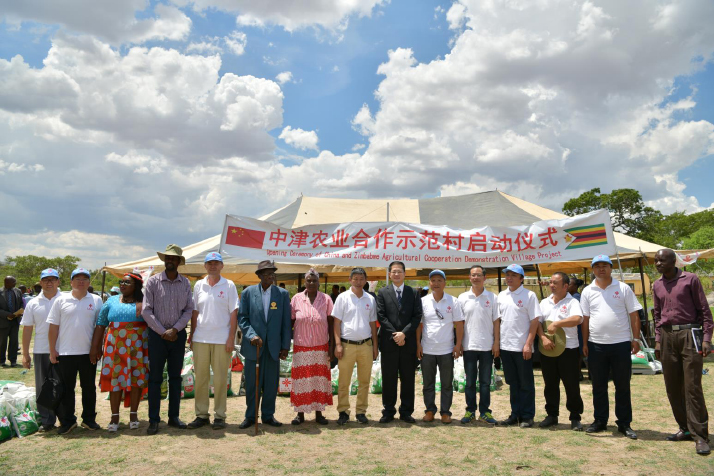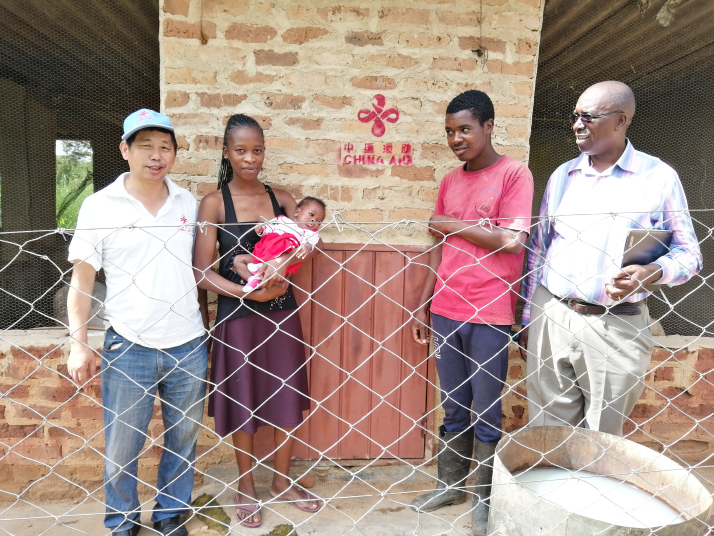|
||||||||||
| Home Nation World Business Opinion Lifestyle ChinAfrica Multimedia Columnists Documents Special Reports |
|
||||||||||
| Home Nation World Business Opinion Lifestyle ChinAfrica Multimedia Columnists Documents Special Reports |
| ChinAfrica |
| Creating a Sustainable Base |
| A Chinese expert in Zimbabwe contributes to sustainable agricultural development |
| By Li Jing | VOL.12 April ·2020-03-31 |

Zhang Shihong is tired, yet smiling. Together with his team, the Chinese expert is leading a field investigation in the village of Chirimanyemba in the Mashonaland West Province of Zimbabwe. The ordinary-looking village is, in fact, a newly-opened demonstration base of the China-Zimbabwe agricultural cooperation project.
"The demonstration village project is a new model for strengthening agricultural cooperation. Under the direction of the Center of International Cooperation Service of the Chinese Ministry of Agriculture and Rural Affairs and the Office of Economic and Commercial Affairs of the Chinese Embassy in Zimbabwe, we have conducted surveys and in-depth discussions with our local partners to choose the village and decide on the cooperation model," he said.
Zhang said two models were ultimately selected: one is a combination of growing corn and raising rabbits, and the other combines corn and chickens. "By carrying out this technological demonstration project, we will contribute to the development of a new type of circular economy to increase incomes and improve the lives of inhabitants here," he said, while looking at the 30-hectare corn plantation.
Before coming to Zimbabwe, Zhang had worked at the Center for Animal Disease Prevention and Control of Fuling County in Chongqing, the largest municipality in southwest China. He has been engaged in animal husbandry and veterinary medicine for 33 years, and as such, had rich theoretical and practical experience in these fields. Then he was appointed to head a mission of Chinese experts for the Third China-Zimbabwe Agricultural Cooperation Program, and arrived in Zimbabwe on November 8, 2018, where they would be working until 2021. The 10 members of the expert team each have their own specialty: animal husbandry, veterinary medicine, agriculture, horticulture, agricultural machinery, as well as irrigation and aquaculture.
This is not Zhang's first work experience in Africa. He worked in Uganda in 2009 and in Zimbabwe in 2013, also as a participating member of Sino-African agricultural cooperation projects. "By taking part in these programs, I hope to express not only my support for the Belt and Road Initiative and the major initiatives unveiled during the 2018 Beijing Summit of the Forum on China-Africa Cooperation, but also my love for Africa. I hope my knowledge and experience will benefit more people here," Zhang told ChinAfrica.

Zhang Shihong with local farmers assisted by the Chinese experts (COURTESY)
A huge potential
As soon as he arrived in Zimbabwe, Zhang found that the local natural conditions were very suitable for the development of livestock industry. The country has 33.28 million hectares of arable land, with nearly 170,000 farms of different sizes, covering more than 6 million hectares. All of these are important assets for the production of animal feed and grazing for cattle and sheep.
"However, the lack of technology, equipment and infrastructure has seriously hindered local agriculture and livestock industry. So, we decided to resolve these problems in order to support the development potential," said Zhang.
After conducting extensive ground research throughout Zimbabwe, Zhang and his team identified the factors that most hampered the growth of local livestock and poultry. The first factor was the lack of technology, particularly in the area of prevention and control of animal diseases. The second was the lack of adequate equipment and facilities. For example, low availability of animal feed has limited productivity and driven up prices, slowing down the growth of livestock industry. And the third factor was the poor and outdated infrastructure in the villages, causing recurrent shortages of water and electricity.
Effective solutions
"Providing training and technical demonstration are among the most effective measures," Zhang said.
Through their coordination with the Zimbabwean authorities, Zhang and his team members organized training classes in eight local agricultural schools. They also visited farming communities in the field to conduct demonstrations with local farmers. Halfway through the project schedule, more than 2,000 people had already taken part in the training, exceeding the initial target of 900 participants.
In addition, the Chinese experts and their local partners chose a number of villages to launch some demonstration projects, including that in Chirimanyemba. "After all, we cannot do everything by ourselves. These projects will enable beneficiary farmers to help more farmers in order to achieve sustainable development." Zhang said that so far, more than 2,000 farmers have benefited from the demonstration projects.
"We are pleased to welcome the Chinese experts here. The "China Aid" logo has entered not only our village, but also our hearts," said Mudede Chamunoruia, a farmer who has participated in the local project.
To address equipment shortage, the expert group sought help from the Chinese Government, which then donated what was really needed by the local people, including incubators, tractors, pumps and laboratory instruments, totaling 112 units. Upon arrival of the cargo, the Chinese experts carried out the installation work with the help of local technicians. They also taught them how to use and maintain the machines and equipment, making sure that everything would be put to use as quickly and effectively as possible.
However, power outages in rural areas remained a problem and limited the use of some brand new machines. Zhang and his group therefore decided to turn to solar energy for power. With help from local technicians, the construction of a solar-powered egg incubation center will be completed in Chirimanyemba Village soon.
In order to fully understand the challenges of Zimbabwe's agricultural sector, the Chinese expert group also conducted numerous field surveys. Each of them offered advice and solutions for existing problems. "We have completed eight in-depth assessment reports, hoping to contribute some of our know-how to Zimbabwe's agricultural development," said Zhang.
Sustainable development
After more than a year since their arrival, the Chinese experts' efforts have been recognized and highly praised by local agricultural officials and the people of Zimbabwe. A number of news stories about the group have also been published in the local media. Moffat Nyamangara, Director of the Department of Agricultural Education and Farmer Training at the Zimbabwean Ministry of Lands, Agriculture, Water, Climate and Rural Resettlement, has applauded the work of the experts on several occasions.
"Although we have achieved some good results, there are still many problems that are hard to solve in the short term. What we truly need is to enhance our local partners' capabilities for self-development, which is more important and valuable than just technology and machinery." According to Zhang, that is the only way to fundamentally promote and achieve sustainable agriculture in Zimbabwe. Zhang also believes that Zimbabwe will need to step up the support it provides to its farmers and increase investment in agricultural infrastructure and technology, in order to improve the country's resilience to natural disasters, land use and productivity.
Comments to lijing@chinafrica.cn
| About Us | Contact Us | Advertise with Us | Subscribe |
| Copyright Beijing Review All rights reserved 京ICP备08005356号-5 京公网安备110102005860号 |